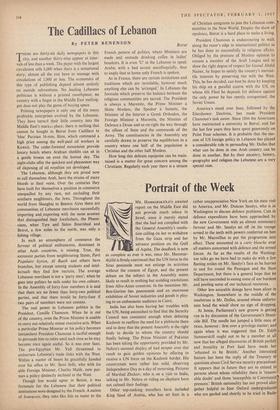The Cadillacs of Lebanon
By PETER BENENSON Beirut THERE are thirty-six daily newspapers in this city, and another thirty-nine appear at inter- vals of less than a week. The paper with the largest circulation sells 6,000 when there is a sensational story; almost all the rest have to manage with circulations of 1,000 or less. The economics of this type of publishing depend almost entirely on outside subventions. No leading Lebanese politician is without a printed mouthpiece; no country with a finger in the Middle East melting- pot does not play the game of buying space.
Printing newspapers is only one of the many profitable enterprises evolved by the Lebanese. They have turned their little country into the Middle East's market-place; there is nothing that cannot be bought in Beirut from Cadillacs to 'blue' Parisian 16-mm. films, which command a high price among the well-paid oil workers in Kuwait. The cedar-forested mountains provide luxury hotels where Arabian sheikhs can sit in a gentle breeze on even the hottest day. The night-clubs offer the quickest and pleasantest way of disposing of oil royalties yet developed.
The Lebanese, although they are proud now to call themselves Arab, have the strains of many bloods in their veins. Over the centuries they have built for themselves a position in commerce unequalled by any race, not excluding their southern neighbours, the Jews. Throughout the world from Shanghai to Buenos Aires there are communities of Lebanese merchants successfully importing and, exporting with the same acumen that distinguished their forefathers, the Phceni- cians, when Tyre and Sidon flourished and Beirut, a few miles to the north, was only a fishing village.
In such an atmosphere of commerce the fervour of political enthusiasms, dominant in other Arab countries, is missing. True, the extremist parties from neighbouring States, Parti Populaire Syrien, Al Baath and others have branches, but except among students and intel- lectuals they find few recruits. The average Lebanese merchant is not a 'party man'; when he goes into politics he sails under his own colours. In the Assembly of forty-four members it is said that there are no fewer than forty-two political parties, and that there would be forty-four if two pairs of members were not cousins.
The real power in Lebanese politics is the President, Camille Chamoun. When he is out of the country, even the Prime Minister is unable to carry out relatively minor executive acts. When a particular Prime Minister or his policy becomes inexpedient President Chamoun is tactful enough to persuade him to retire until such time as he may become once again useful. So it was over Suez. The . pro-Egyptian Mr. Yafi threatened to embarrass Lebanon's trade links with the West. Within a matter of hours he, gracefully handed over his office to Mr. Sami Solh, who with his able Foreign Minister, Charles Malik, now pur- sues a policy distinctly inclined to the West.
Though few would agree in Beirut, it was fortunate for the Lebanese that their political institutions were designed by the French. A nation of bourgeois, they take like fish to water to the French pattern of politics, where Ministers are made and unmade drinking coffee in ladies' boudoirs. It is even in the Lebanon to speak Arabic with a bad accent uncolloquially, thus to imply that at home only French is spoken.
As in France, there are certain institutions and traditions which are inviolable, however much anything else can be 'arranged.' In Lebanon the formulae which preserve the balance between the religious communities are sacred. The President is always a Maronite, the Prime Minister a Shiite Moslem, the Speaker a Sunnite, the Minister of the Interior a Greek Orthodox, the Foreign Minister a Maronite, the Minister of Defence a Druse and so on right the way through the offices of State and the commands of the Army. The constituencies in the Assembly are carefully drawn to preserve the equilibrium in a country where one half of the population is Christian and the other half Moslem.
How long this delicate equipoise can be main- tained is a matter for great concern among the Christians. Regularly each year there is a stream of Christian emigrants ,to join the Lebanese com- munities in the New World. Despite the show of opulence, Beirut is a hard place to make a living.
President Chamoun is endeavouring to walk along the razor's edge in international politics as he has done so successfully in religious affairs. Obliged by the pressure of Moslem opinion to remain a member of the Arab League and to show the right degree of respect for Gamal Abdul Nasser, he hopes to satisfy the country's mercan- tile interests by preserving ties with the West. This, he has decided, can best be done by keeping his ship on a parallel course with the US, on whose 6th Fleet he depends for defence against the only power he has openly antagonised, the Soviet Union.
America's stand over Suez, followed by the Eisenhower Doctrine, has made President Chamoun's task easier. Since 1866 the Americans have maintained a university in Beirut, and for the last few years they have spent generously on Point Four schemes. It is probable that the suc- cess of US foreign policy in Lebanon has played a considerable role in persuading Mr. Dulles that what can be done in one Arab country can be done in another. But by their ancestry, history, geography and religion -the •Lebanese are a very special case.


































 Previous page
Previous page